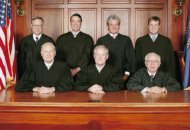12/24/2015
Kentucky Supreme Court Rejects Sloppy DUI RoadblocksAdvanced warning signs are now mandatory for DUI roadblocks in Kentucky.

The US Supreme Court gave law enforcement ability to stop and interrogate motorists without individualized suspicion through drunk driving roadblocks set up according to a few simple requirements. Kentucky's high court last week chastised the state police for setting up a driving under the influence of alcohol (DUI) roadblock without bothering to meet the requirements, or "recommendations," laid out in the 2003 Kentucky v. Buchanon case. On Thursday, the high court made those recommendations mandatory.
The justices made the decision in the context of a DUI checkpoint set up on Kentucky Highway 68 in Gravel Switch on February 2, 2008. Although no officer witnessed Billy Cox driving impaired that evening, the motorist was ordered to perform field sobriety tests. After Cox failed, he was booked for DUI. He subsequently appealed his conviction on the grounds that the roadblock failed to meet the bare minimum standards set by high court precedent.
No signs were placed indicating that a DUI checkpoint was in progress, and the media were not given any notice that checkpoints might happen. The troopers who blocked traffic failed to wear "safety vests." These failures raised concerns among the high court justices.
"If law enforcement is permitted to continue conducting indiscriminate seizures of individuals at a roadblock without any basis in suspicion, we must ensure that officers do not abuse this privilege," Chief Justice John D. Minton Jr wrote for the court. "It is implicit in our analysis that without proper planning and notice, roadblocks are susceptible to the type of discretion and intrusion the Fourth Amendment exists to forbid. It is unclear to us here whether those discretion-limiting procedures were adequately performed."
Police officers are supposed to set up roadblocks with approval and guidance from their supervisors. Here, troopers called their sergeant who gave approval over the phone as the roadblock was being set up. Trooper Nathan Rhodes, the officer in charge of the roadblock, arrived twenty minutes after the roadblock began. Even though the justices considered this level of oversight "cursory," it was enough. The same cannot be said for the requirement of advance notice. The majority did not believe merely having troopers in uniform with marked cruisers sufficiently informed the public about what was taking place.
"In circumstances where the practices and procedures employed by law enforcement are constitutionally ambiguous, it is our duty to protect individuals against the risk of potentially unreasonable seizure without any suspicion of wrongdoing," the chief justice wrote. "Though we do not require rigid compliance with the Buchanon guidelines, we cannot continue to soften the edges of what is constitutionally reasonable."
The failure to display advance warning signs and wear safety vests was enough to render the roadblock unconstitutional. A copy of the decision is available in a 250k PDF file at the source link below.


